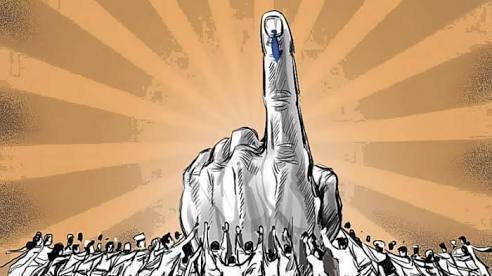ONE VOTE: How a single Vote has changed victory to loss in Five Indian Elections
Ask Mahant Bharatdas Darshandas, the lone voter in Gujarat’s Gir forest who votes in every election. To ensure that he is able to vote, the Election Commission of India sets up a polling station in the forest solely for him. To him, the single vote matters. Darshandas is, however, an exception to the general rule.
We may be the world’s largest democracy, yet, as a country, we don’t seem to be too convinced about the power of the vote. That is why, even 70 years after independence, low voter turnouts are still a thing in India. At times, we even tend to shift the responsibility of keeping our democracy healthy on the person-next-door. However, as much as one would like to believe that one vote isn’t going to change anything in the country, there have been times in the history of our nation where a vote has altered the course of an election. Don’t believe us? Here are five such instances:
Karnataka Assembly Elections (2004): A R Krishnamurhthy of Janata Dal (Secular) lost to R Dhruvanarayan of Congress by just one vote. They got 40751 and 40752 votes respectively while contesting the Santhemarahalli (Sc) constituency. And here is the kicker: Krishnamurthy had stopped his own driver from voting!
Rajasthan Assembly Elections (2008): State Congress Chief C.P. Joshi lost to Kalyan Singh Chouhan of BJP by a single vote, with Joshi polling 62215 votes against 62216 votes being polled by Chouhan. Had Joshi’s own mother, wife, and driver turned up to vote, Joshi could have won!
Mohali Municipal Corporation Elections (2015): Kulwinder Kaur Rangi of Congress again won by a margin of just one vote against Nirmal Kaur, of the Akali Dal rebel Kulwant Singh-led ‘Azad group’.
BMC Election (2017): In the recently concluded municipal elections in Mumbai, candidates contesting ward no. 220 got to understand the importance of a single vote first hand. In the election, the seat first went to Surendra Bagalkar of the Shiv Sena. However, when the BJP candidate Atul Shah demanded a recount, it was found that both candidates had polled the same number of votes – 5,946. Shah finally won the seat based on a lottery. But had a single person voted in either’s favour, the result could have been different!
Motion Of Confidence Vote, Lok Sabha (1999): Not exactly a vote by the janta, but when Prime Minister Atal Bihari Vajpayee moved a motion of confidence in the parliament to prove he had the support of the majority, his 13-month old government fell for want of just 1 vote.
And that, friends, is the difference one vote can make in a democracy!
Article first published on YouthKiAwaaz.



